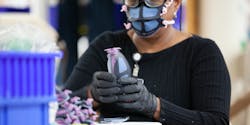A Shared Purpose: Leadership and Culture at COVID-19 Innovators
As entire segments of the economy sit idle, the stories, thankfully, are many, of manufacturers swiftly shifting their operations from their usual products and components to items necessary in the fight against COVID-19. Automotive manufacturers, for instance, are reaching deep into their vast, complex supply chains to source the hundreds of parts needed to make ventilators—and enlisting their highly trained workforces to assemble them. Running-shoe manufacturers are using their stock material in new ways to produce high-grade face masks. High-tech metalcrafters are deploying their 3D-printing equipment and expertise to print die-inserts for protective shield parts. And don’t forget the whiskey distillers, like tiny Wolf Spirit Distillery and many other distilleries from miniscule to ginormous, who quickly shifted to making hand sanitizer for healthcare workers as soon as they heard there was a need.
Which got us thinking: What leadership and cultural traits distinguish a company that can pivot its operations quickly as needed, from one that takes months or years to make any big changes. And what are the benefits, both tangible and intangible, of such efforts?
Earlier this month, IndustryWeek Tech Editor Peter Fretty reached out with a survey to a multitude of manufacturing companies innovating in response to COVID-19. Forty-five companies responded, sharing their approaches and challenges and giving a window into their operations and culture. There were some common themes around leadership in their responses—themes that should resonate with companies looking to inject innovation into their own operations.
A Shared Purpose
Some manufacturers are discovering strengths they never knew they had. “Companies who otherwise would find multiple reasons why something cannot be done manage to remove barriers quickly and find ways to say, ‘Yes, we can do that,’ and ‘You can count on us’ during this crisis situation,” wrote Deborah Jennings-Conner, UL’s director of global life and health sciences regulatory and testing. Having a shared purpose is making them more open to new ways of doing things and streamlining their processes.
Manufacturers successfully innovating around COVID-19 “will have learned much about quality control and the fact that you cannot inspect product quality at the end of the production line, but rather must build quality into the entire process, starting with the design,” Jennings-Conner added.
These companies are also reaching beyond their comfort zones and finding new ways to partner—we see that with automakers and medical device companies, for instance, sharing expertise and resources. Dave Jordan, global head of consulting and services integration for Tata Consultancy Services, says that as the economy shifts and the fragility of supply chains is laid bare, relationships will spring up in unlikely places. “We’ll see less resistance to shifting towards a partnership mindset, even those that violate conventional wisdom, to meet the new normal—especially if that means cooperation and collaboration among competitors, versus not coming back at all,” Jordan responded.
Continuous Improvement
Manufacturers that have dedicated themselves to developing a culture of continuous improvement are finding that already having people and systems in place, working together and knowing each others’ jobs and work styles, are benefiting them in new ways in a crisis. Plastic bag maker CMD Corporation, for instance, was able to pivot to making face shields quickly because it had already developed an in-house 3D Printing Group to enhance its production. “Because we have multiple people that understand the technology, we were able to utilize the skills of Adam, a manufacturing engineer working from home to program the parts, and Garrett, a manufacturing engineer working in the plant, to run the parts. Thus they shared the workload,” the company wrote in the survey.
Prioritizing product improvement allowed Mirage Systems, manufacturer of parachutes, to quickly pivot to making mask covers. “We’re constantly working on ways to improve ourselves,” they wrote. “For instance, comfort is often forgotten when creating a product that saves lives. We know the importance of making our products comfortable—because that makes the difference when end users wear them all the time. We also understand how making things look great makes a difference—and we’re focusing on detail over detail every day.”
R&D
Dan T. Moore, a group of manufacturing companies that make everything from Army helmet pads to green roof trays, shifted to manufacturing ventilators during the crisis. CEO Dan T. Moore III says that investing 5 to 8% of annual sales in new technology and “having a strong bench of technologists” enables the company to respond quickly to new opportunities or changes in the market. “Keeping a strong balance sheet so you can take calculated risks and having a diversified portfolio which is not dependent on any one part of the economy” are also key, he says.
JMA, a maker of 4G/5G communications equipment now making ventilator systems, agrees that investing in highly skilled tech people helps make an organization more nimble. “With the skills we have on-hand from machine, electrical and software engineers, we were able to pivot some key people and have them laser focus on this project in order to develop a plausible solution,” said the company in its response.
A “start-up, rapid-response culture” allowed Nufabrx, maker of medicated fabrics like compression socks and carpal tunnel gloves, to pivot to making $2M worth of masks to healthcare providers in less than two weeks. And Mohawk Flooring’s “first to market” mindset (it was a pioneer in 100% recyclable carpeting) inspired employees to investigate where they could innovate to help their community in a crisis. Mohawk is now manufacturing gowns, masks and faceshields
The benefits of being able to quickly pivot during a crisis? Keeping employees employed, boosting morale, making processes more nimble and efficient, and creating new opportunities for partnerships and new types of products to manufacture. Sounds like a winning way to operate.
Main Photo: A worker making face masks at a New Balance facility.
Second Photo: Medicated swabs being printed at 3D Systems.
About the Author

Laura Putre
Senior Editor, IndustryWeek
As senior editor, Laura Putre works with IndustryWeek's editorial contributors and reports on leadership and the automotive industry as they relate to manufacturing. She joined IndustryWeek in 2015 as a staff writer covering workforce issues.
Prior to IndustryWeek, Laura reported on the healthcare industry and covered local news. She was the editor of the Chicago Journal and a staff writer for Cleveland Scene. Her national bylines include The Guardian, Slate, Pacific-Standard and The Root.
Laura was a National Press Foundation fellow in 2022.
Got a story idea? Reach out to Laura at [email protected]

